20 years ago 3% of cars in English cities were sports utility vehicles. Today, that figure has leapt to 30%.
According to new research published by Clean Cities, ‘carspreading’ has increased 10 fold in major urban areas. There are now enough SUVs on England’s roads to cover the City of Manchester, or the London Borough of Kensington & Chelsea.
The capital itself is home to around 800,000 sports utility vehicles, up from 80,000 in 2002. Meanwhile, England as a whole now has around 8.2million SUVs on its roads.
‘The sheer scale of carspreading in our cities is staggering. In London alone, SUVs now take up as much space as an entire inner-city borough – that’s tarmac we could be using for homes, parks, or safer streets,’ said Oliver Lord, UK Head of Clean Cities.

‘These oversized vehicles are not just swallowing our public space; they’re also far more dangerous, especially for children,’ he continued. ‘If we want cities that are safe, breathable and accessible, we have to get serious about tackling the rise of these urban land-hogs.’
The rapid growth of this automative sector is has sparked concern for a number of reasons. Safety is a significant issue, with an SUV 14% more likely to kill a pedestrian or cyclist in a collision, or 77% more likely to kill a child, compared to traditional cars.
According to a 2023 study by the campaign group Possible, internal combustion engine SUVs are also more polluting — the average model in 2023 had higher emissions than a traditional car built in 2013.
Space is also a major problem, with 71% of car owners reporting parking has become more difficult with the rise in large, heavy vehicle ownership, leading to Cardiff City Council to introduce a weight based threshold to try and free up room. Paris already has higher parking costs for SUVs, leading to a two-third reduction in surface parking amongst owners.
‘SUVs increasingly dominate our streets. In just two decades, the share of SUVs in English cities has grown tenfold. In London, the number of SUVs has swelled by around 720,000. This has important implications for congestion, public space, and road safety,’ said Dr Anna Goodman, an academic transport researcher and director of Transport for Quality of Life, who worked with Clean Cities on the research.
‘The evidence is clear that SUVs increase road danger for people walking and cycling, particularly for children. Many cities around the world are bringing in targeted measures to discourage SUV ownership and use, and early reports from Paris indicate that these measures can be successful,’ she continued.
Image: Brandon Green / Unsplash
More on Transport, Infrastructure & Planning:
Birmingham City University secures funding for UK transport and climate change research
Wiltshire Council plugs-in Salisbury electric buses with new charge points
Lyft confirms fully electric autonomous rides for UK in 2026
 Create Account
Create Account





